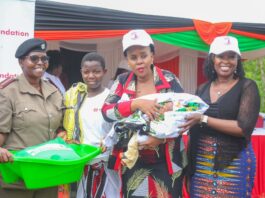Jacinta Mathenge looks at her 14-year-old son, Victor Mwangi, and breaks into a smile. But behind that broad smile is an 11-year journey she has walked with her him since she learnt that he was dignosed with autism.
“The experience has changed me,” says the 52-year-old mother of three. “I have learnt to be patient, to love more, and not to compare Victor with any other child. He is a special gift from God,” she says.
As a toddler, Victor seemed like any other child. But his mother realised that something was wrong when, at the age of three, he could not understand simple instructions.
“For instance, he could not give me a cup or spoon placed before him when I asked him to,” says Ms Mathenge.
He was also hyperactive and always running around the house. She could not figure out what the problem was, “but I noted that there was a big difference between him and Triza, his elder sister,” she offers.
It was not until she enrolled Victor for preschool at a private institution in Embu, where they were living at the time, that his teacher alerted her to the problem. That was in 2005, and Victor was in Baby Class.
“I had gone to pick him up from school one afternoon and his teacher told me, “Your child cannot hear,” Ms Mathenge recalls.
This got her concerned, but she still could not relate Victor’s lack of attention to her simple simple instructions at home to what the teacher had told her. So she took him to paediatric clinic in Nairobi for a hearing test, hoping the diagnosis would help point the way forward.
“But the doctor said that Victor could hear – even a fly,” Ms Mathenge recalls.
This saw Victor, who is now student at Oshwal Academy Nairobi Primary’s Inclusive Education Department (IED), referred to the Kenyatta National Hospital (KNH), where doctors confirmed that he was suffering from autism.
Autism is a spectrum disorder characterised by difficulties in social interaction, verbal and non-verbal communication and repetitive behaviour, says Mercy Njeri Muchiri, a special-needs teacher at Oshwal Academy Primary School in Westlands, Nairobi.
Following the diagnosis, Victor was booked for a monthly clinic at the Kenyatta National Hospital , where doctors said that he would outgrow the condition. But that did not happen, Ms Mathenge says.
In 2008, she enrolled Victor in a school in Limuru that admitted children with autism. In the meantime, some relatives told her of a good doctor in the US who could manage autism well. This saw Ms Mathenge and her son leave the country in December 2009 in for consultation with the doctor.
“We stayed in North Carolina for a year while Victor underwent speech and occupational therapy and attended pre-school,” she says.
They returned home in December 2010, with Victor’s condition considerably improved. “He was less hyperactive; the running around had reduced,” says Ms Mathenge.
She immediately enrolled him at Kasarani Primary School, Nairobi, which has an autism unit, but moved him to the Oshwal Academy Nairobi Primary in 2011.
“I was referred to the school by another parent. She told me that Victor might benefit from the Oshwal programme. Though I had become weary of changing schools, I decided to give it a try,” Ms Mathenge explains.
This is Victor’s sixth year at Oshwal Academy, and he is showing progress, she says.
“He has acquired some life skills; he can now take a bath, dress himself, and go to the toilet unassisted. These are things he could not do on his own before,” Ms Mathenge points out.
She is optimistic that her son is on the road to an independent life.
“Although I cannot leave him at home alone at the moment, we are getting there,” she says. Victor loves the outdoors, so during his free time he goes swimming, rides his bicycle or plays football with boys in their neighbourhood.
But he is yet to develop full speech and uses alternative techniques to communicate. “For instance, when he wants something, he pulls me to where it is. And at the supermarket, he picks what he wants,” Ms Mathenge offers.
Victor’s condition comes with other challenges too. Sometimes he gets very hyperactive. “I might be walking with him on the street when he suddenly pulls away and runs, so I have to call out to people to restrain him. Sometimes onlookers do understand that he is a child with special needs,” Ms Mathenge says.
Ms Mathenge has always had to hire a helper to look after her son, but most of them leave after about a week. “They cannot cope with his hyperactivity,” she explains.
However, her husband and family have been very supportive. “My husband adjusts his schedule so that he can take care of Victor and spend time with him whenever I am busy,” says the businesswoman.
And as is often the case with other special-needs education, Ms Mathenge says that it is expensive to manage a child with autism. The care and education are quite costly. This, she adds, is an issue that the government should address.
“Most of the affected parents cannot afford the cost of private special education,” She points out.
A look around the country shows that only a handful of government schools have integrated special-needs education. And of these, only a few have special-needs education teachers.
One of the most important lessons Ms Mathenge has learnt from living with Victor is patience. “Victor does not acquire skills instantly. Sometimes, I have to repeat the same thing every day for a month for him to understand and apply,” she says.
With time, she has learnt to be persistent and consistent when teaching him life skills. “It is a continuous learning process, and this has also changed me as a person. I am calmer, I now listen more, and give him more time to learn,” Mathenge offers.
She has also learnt the importance of early intervention, and says it important that the child start with speech and occupational therapy before they outgrow the programme. In addition, she now knows that special-needs children should be put on a diet that reduces on their hyperactivity.
Consequently, Victor will forever be on a gluten-free, no-sugar and no-milk diet. This means that his diet excludes wheat products and soft drinks. But he can take camel milk and small quantities of soy milk.
Ms Mathenge’s biggest goal? “I want Victor to gain independence. From speech, to reading and writing, to discovering his talents and gaining life skills. That way he will be able to lead a near-normal life. I am doing my part wholly as I leave everything else to God.”



